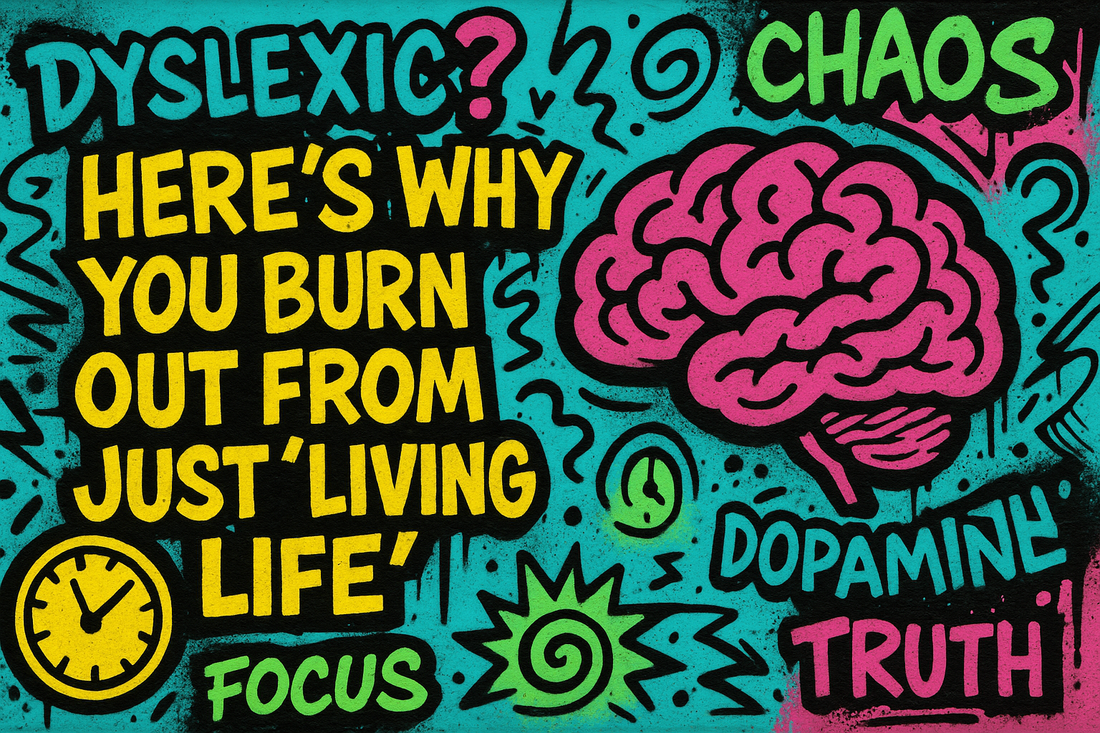
Dyslexic? Adhd? Here’s Why You Burn Out From Just ‘living life’
Share
Feeling constantly on edge or exhausted, yet unsure why? You’re not alone. In the latest episode, Stephen Martin dives into the world of neurodiverse burnout, drawing from his own experiences with dyslexia and ADHD. This conversation is a powerful reminder that burnout doesn’t equal laziness. It’s a chance to understand how your brain works and to realise the importance of proper rest.
In this episode, Stephen discusses practical ways to handle overstimulation and highlights why recognising the signs of burnout matters. It’s a warm, honest look at the hidden challenges and everyday victories of living with a neurodiverse mind.
The Challenge of Overstimulation
Overstimulation is more than feeling frazzled or distracted. For many of us with dyslexia or ADHD, it can feel like there’s a traffic jam in our heads. Everything blares at once: bright lights, background noise, responsibilities, plus all the racing thoughts we can’t seem to quiet. This constant mental load often wears us down before we spot the red flags.
What makes overstimulation tricky is that it sneaks up on you. You might try to push through each day, convinced you just need to work harder. Then, out of nowhere, you crash. When you feel yourself snapping at innocent questions or struggling to organise simple tasks, that’s rarely “laziness.” It’s your mind hitting its limit.
The Warning Signs of Neurodiverse Burnout
Burnout doesn’t always present the same way. Perhaps you start to feel numb. Maybe your energy reserves are non-existent, yet you can’t sleep. Or you might notice constant zoning out, as your brain tries to conserve what little fuel it has left. When you’re neurodiverse, these symptoms can send you on a frustrating loop: procrastinate, panic, blame yourself.
If you’ve ever thought, “Why do I feel so empty?” or “I’m exhausted but can’t stop thinking,” you might be in burnout mode. Awareness is key. As Stephen Martin says:
“I used to think burnout was just me being lazy, but it’s not that at all. It’s a real mental exhaustion caused by overstimulation.”
Noticing these signals earlier can help you tap the brake before your system goes into overdrive.
The Power of Rest and Boundaries
Rest isn’t just about lying on the couch scrolling social media. True rest should be restorative. That might mean a gentle yoga session, a walk in the park, or simply doing nothing while you let your mind wander. Distractions like scrolling Instagram or watching random videos are fine in moderation, but they’re rarely the deep rest your brain craves.
This is where boundaries come in. You can’t keep saying yes to every request if you never say yes to yourself. Setting firm limits might feel strange at first, especially if you’ve always overextended yourself to keep up with peers. But if you truly want to recover from burnout, you need to protect your energy. That can mean heading to bed earlier or declining that extra project at work. Boundaries are essential for mental health.
Building a Supportive Community
People who understand your neurodiverse mind can make a huge difference in your progress. Friends, fellow dyslexics, or ADHDers often get it on a level that others might not. It’s powerful to have someone say, “Yep, I’ve been there,” when you’re struggling to maintain focus or feeling burnt out from yet another bombardment of thoughts.
Sometimes the best step is connecting with those on the same path. Whether it’s through a local meetup or an online group, sharing experiences can normalise what you’re going through. It reminds you that neurodiverse burnout is common, and you’re not flawed for feeling overwhelmed. A supportive community helps you remember you have options, and you’re not alone in this journey.
- Remind yourself it’s OK to rest, even if society suggests otherwise.
- Carve out time for activities that calm your neurons.
- Play with different approaches, like journalling or short meditation breaks.
- Be open to learning from your experiences and trying new strategies.
It’s also wise to seek professional guidance if your burnout feels severe or chronic. Therapists, coaches, or counsellors who specialise in dyslexia and ADHD can offer tailor-made tools to reorganise your life and mindset.
Takeaways
- Feeling mentally exhausted doesn’t mean you’re lazy.
- Burnout often sneaks up when your brain is overstimulated.
- Recognising those warning signs early lets you address issues sooner.
- Rest that restores is different from a quick distraction.
- Clear boundaries protect your energy and mental health.
- Owning your well-being helps you regain control.
- Community support can balance out those lonely moments.
- Numbing behaviours can offer momentary relief, but moderation is key.
- Awareness and self-compassion can move you towards healing.
Ready for more? Don’t miss this episode at the top of the page to hear Stephen’s candid thoughts on neurodiverse burnout. You’ll find practical tips, personal stories, and an honest reminder that you’re in charge of your own mind. If you want to dive deeper, visit truthaboutdyslexia.com or join our friendly community on Facebook at facebook.com/groups/adultdyslexia.
Looking for an extra boost? Check out RightBrainResetters.com and connect with people who understand the unique journey of dyslexia and ADHD. Don’t let a label define you. Embrace your mind, with the right tools and support in your corner.

